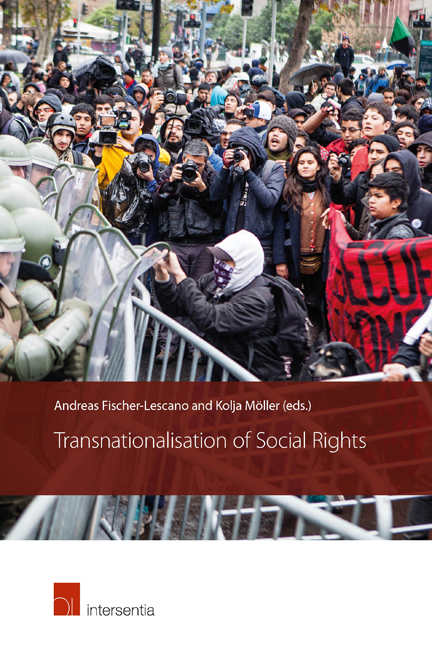Book contents
- Frontmatter
- Contents
- List of Contributors
- List of Abbreviations
- Chapter 1 Introduction
- PART I TRANSNATIONAL SOCIAL RIGHTS IN CONTEXT
- Chapter 2 The Struggle for Transnational Social Rights
- Chapter 3 Normative Perspectives on Transnational Social Rights
- Chapter 4 Conceptualising Transnational Social Rights: Developments and Forms
- PART II FOUNDATIONS, INSTITUTIONS AND ENFORCEMENT STRUCTURES
- PART III ENFORCEMENT OF TRANSNATIONAL SOCIAL RIGHTS
- Index
Chapter 4 - Conceptualising Transnational Social Rights: Developments and Forms
from PART I - TRANSNATIONAL SOCIAL RIGHTS IN CONTEXT
Published online by Cambridge University Press: 12 December 2017
- Frontmatter
- Contents
- List of Contributors
- List of Abbreviations
- Chapter 1 Introduction
- PART I TRANSNATIONAL SOCIAL RIGHTS IN CONTEXT
- Chapter 2 The Struggle for Transnational Social Rights
- Chapter 3 Normative Perspectives on Transnational Social Rights
- Chapter 4 Conceptualising Transnational Social Rights: Developments and Forms
- PART II FOUNDATIONS, INSTITUTIONS AND ENFORCEMENT STRUCTURES
- PART III ENFORCEMENT OF TRANSNATIONAL SOCIAL RIGHTS
- Index
Summary
INTRODUCTION
As has been elaborated on in the introduction to this volume, there are numerous ways of approaching transnational social rights. This chapter maps and conceptualises transnational social rights from a global social policy perspective. This fulfils two aims: on the one hand, it provides an alternative approach to the study and understanding of transnational social rights; on the other, it contributes to the literature on global social policy by adding to recent attempts at conceptualising and theorising this field of study.
Case studies are one approach used in the literature on global social policy. Theory-testing has also been used as a way to refine and improve existing global social policy concepts. Bob Deacon and Paul Stubbs have applied common concepts from sociological theory (agency, structure, institution, and discourse) to the study of global social policy, and some chapters in a volume on global social governance approach the theorisation of global social policy and governance with reference to inter- and intra-actor relationships, and as a metatheoretical concept.
Nevertheless, it is not only the way, but also the understanding of what exactly makes a theory or a concept, and what the appropriate process of theorybuilding is, that differs between different scholars and disciplines. At the most general level, theory-building has to do with making sense of something. Oft en, it is associated with explanations about what is causing a particular, observed outcome (causal models or relationships). A theory, though, also has to do with a generalisation, and, therefore, theory-building can also take the form of establishing typologies and systematising observed phenomena, which then facilitates further, more detailed, and causal theoretical arguments.
This chapter focuses on the systematisation of transnational social rights as one element of global social policies (along with global social re-distribution and regulation). In particular, the meaning of the “social” in global social policy is central here, which contributes to a refined concept of global social policy, and related governance structures, and in this way specifies the meaning and importance of transnational social rights as well.
- Type
- Chapter
- Information
- Transnationalisation of Social Rights , pp. 67 - 84Publisher: IntersentiaPrint publication year: 2016
- 2
- Cited by



